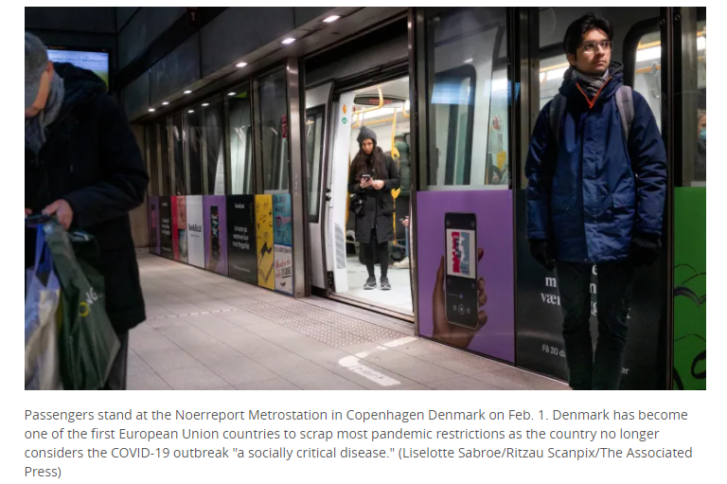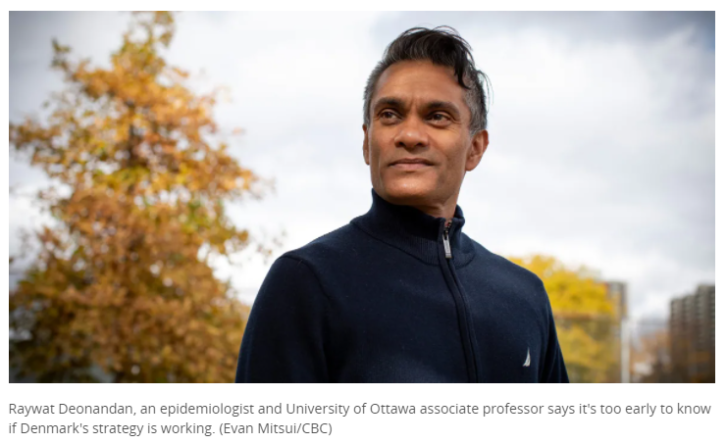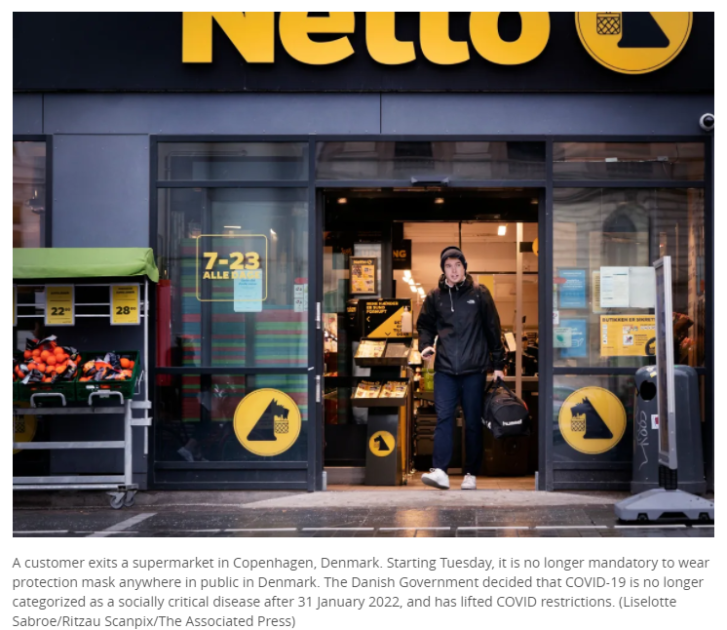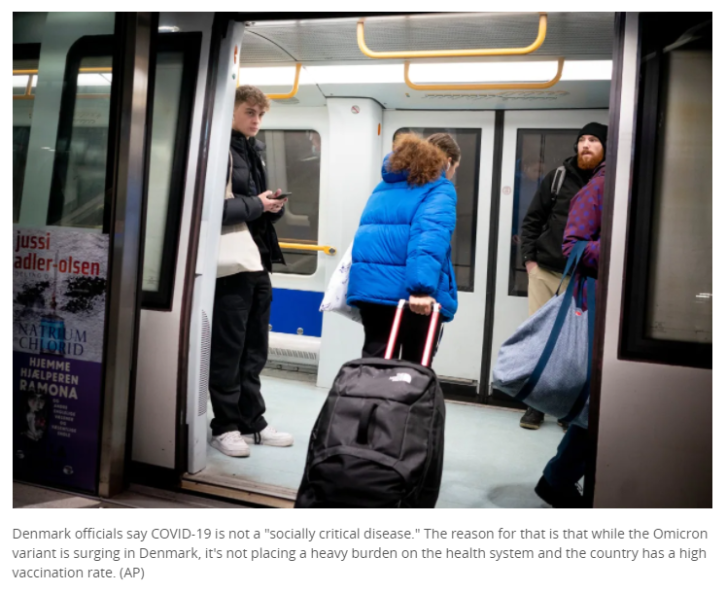The Scandinavian country no longer considers COVID-19 ‘a socially critical disease’
Denmark became one of the first countries in the European Union to lift most of its pandemic restrictions earlier this month.
Denmark health officials say they no longer consider COVID-19 “a socially critical disease.”
As many Canadian provinces begin lifting restrictions and getting rid of vaccine passports, Raywat Deonandan, an epidemiologist and an associate professor at the University of Ottawa, spoke to Dr. Brian Goldman, host of CBC podcast The Dose, about what Canada can take away from Denmark’s decision.

The following transcript has been edited for clarity and length.
Q: In terms of opening things up, give us the broad strokes of what Denmark has done that makes it stand out from other nations?
A: Denmark has decided that they are done with COVID.

They’re no longer pursuing an act of cajoling and encouraging vaccination strategy. They’re no longer requiring people to isolate after being infected. They’re encouraging it, but not requiring it. And they have removed almost all COVID-19 restrictions across the board. They’ve accepted that the virus is with them and here to stay.
Q: And last week, health authorities in Denmark said they were considering winding down the country’s coronavirus vaccination program this spring. How does that factor into Denmark’s unique approach?
A: They’re accepting that a certain proportion of people will never receive vaccination, which sounds like a bit of surrender in my mind.
It might be true that a small proportion never will. It doesn’t mean you have to stop trying. The job of public health is to encourage people to adopt the best tools to keep themselves safe.
And one should never cease in that endeavour.
Q: Obviously you weren’t in the room when Danish authorities made the decisions that they made, but what’s your understanding of why they did it?
A: My understanding is they have accepted certain realities for their society. They’ve accepted that the number of people seeking and accepting vaccination has plateaued.
They’re accepting that they probably won’t be getting any better quality vaccines any time soon. By which I mean vaccines that can accommodate all future variants.

And they’ve accepted that the demand for an open society is probably greater than concern for unrestricted transmission. They probably have also factored in something to do with economic costs.
There’s a lot that goes into this kind of decision-making. It’s not all scientific. Some of it’s sociological. Some of it is political.
So they have decided that their population is responsible enough that they can manage the pandemic at an individual level, not requiring state intervention.
Q: There are several ways to measure if it was a good or bad decision, but do you think it has worked when it comes to bringing things back to normal, whatever that is, of course?
A: It comes down to what you define as normal, first of all.
I will preface this by saying I don’t think we should be seeking 2019 levels of normal necessarily. 2019 normal is what got us into much of this problem in the first place, by which I mean, we have people going to work sick. We have people being disdainful of public health as a whole.

I think we should be seeking a kind of normal that prevents future public health tragedies and crises from manifesting in the first place. But the question is, has Denmark succeeded in achieving some semblance of normal? I think they have in a sense that there are people out and about “living their lives,” going to parties, going to nightclubs, going to restaurants.
On the other hand, they are suffering in the sense that the pandemic numbers are very, very high. Is their healthcare system under stress? It is, but not as much as you might expect, probably because they have greater healthcare capacity than we happen to have in Canada.
So I think the bottom line is it’s too early to know if their strategy is working. I’m very skittish and concerned. I look at these exploding numbers and I’m a little scared by them, to be honest, but I’m rooting for them.
I hope it works for them because that’s a signpost for the rest of us. But I’m skeptical.
Q: What signs are there that Canada is heading towards a Denmark reopening?
A: We have many provinces signaling that they wish to remove restrictions soon. Now, the Denmark model would state two things: You remove all restrictions at once and you give up on pushing vaccination.

I don’t think any provinces here have said those two things, but there is a strong sense that some, Alberta comes to mind, are eager to drop a lot of restrictions very, very soon.
In Ontario, I think there is a recent announcement about the vaccine passport system, if I can call it that, will be done away with by March.
And this is concerning because you shouldn’t be tying calendar dates to decisions that are scientific and epidemiological. These things should be linked to indicators so we can observe objectively in the population.
That suggests to us that now is an optimal time to be removing certain restrictions. Canada looks to be bending in that direction.
Q: Would the Danish approach work in Canada? You’ve already started to say that there are some reasons why you have doubts, but what’s your answer?
A: Canada is not Denmark. We have a provincial healthcare system, they have a national one. Ours is a geographically more diverse country. I think we have a wider gap between rich and poor, more inequities.
Our healthcare capacity is less on a per capita basis than Denmark’s. And in fact, in terms of Organisation for Economic Co-operation and Development (OECD) nations, Canada ranks near the bottom in terms of healthcare capacity. So our ability to absorb a large number of hospitalizations is much less.

While our vaccination rates are high and they are comparable to Denmark, I think they should be higher. So my answer really is no, I don’t think Canada should be going this way.
I don’t think it’s appropriate to download the responsibility of public health management onto the individual. Eventually, it will be. We’ll get there eventually, but to do so all at once while removing restrictions, while giving up on vaccination, while we’re still in the midst of a pretty serious wave, strikes me as an unfortunate thing to be considering.
Q: I know these are early days in the relaxed measures in Denmark. What can we learn, if anything, from what’s going on in Denmark right now?
A: Well, we can learn to expect an extremely high rise in cases and hospitalizations and deaths if we were to take that same path.
We will also learn that a large number of people will believe that their life has come back. And for a very large number, it will be true.
But we cannot lose sight of the fact that for an important proportion of individuals, there will be untoward suffering. So we have to ask ourselves a values-based question, which is: Are we the kind of society that wants to take care of that proportion that is going to be suffering unduly? Or are we the kind of society that wants our lifestyle back at all costs?
This is an important moment in Canadian history. We have to decide upon the nature of our society and the values with which we wish to go forward into this world.
Article From: CBC News
Author: Produced and written by Stephanie Dubois. With files from The Associated Press

